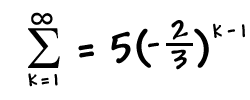YOUR TURN:
Find the sum

But, we're not quite done yet.
| Our formula only works when |
|
. |
| So, what if r is something like |
|
? Then the series does not have |
| a sum. It shoots off to infinity. When this happens, we call the series "divergent." | ||
So, if someone asks you to find the sum of an INFINITE geometric sequence, CHECK THE RATIO!
| If |
|
, crunch the sum. |
| If |
|
, say something like |
"There's no finite sum. This critter's divergent!"
TRY IT:
Find the sums (if possible):

